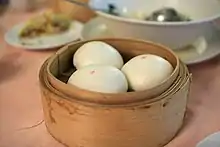 Wrapped lotus seed buns | |
| Type | Sweet bun |
|---|---|
| Place of origin | China |
| Main ingredients | Yeast-based dough, lotus seeds |
| Lotus seed bun | |||||||||||||||||||||||
|---|---|---|---|---|---|---|---|---|---|---|---|---|---|---|---|---|---|---|---|---|---|---|---|
| Traditional Chinese | 蓮蓉包 | ||||||||||||||||||||||
| Simplified Chinese | 莲蓉包 | ||||||||||||||||||||||
| Hanyu Pinyin | lián róng bāo | ||||||||||||||||||||||
| Cantonese Yale | lìhn yùhng bāau | ||||||||||||||||||||||
| |||||||||||||||||||||||

Lotus seed buns: this particular variety is available in many typical Cantonese restaurants as a type of dim sum.
A lotus seed bun is a Chinese sweet bun found in China. They are prepared by steaming a yeast-leavened dough that contains lotus seed paste.[1] It can be classified as a dim sum, though not exclusively so.
Preparation
Because the bun has a variety of different appearances, the dough especially, can be different depending on where it is made. The dough is generally made of similar substances like the ones used in char siu baau.
See also
References
- ↑ Chang, Norma (2001). My Students' Favorite Chinese Recipes. The Travelling Gourmet. p. 28. ISBN 9780961875947. Retrieved May 8, 2012. ISBN 0961875941
This article is issued from Wikipedia. The text is licensed under Creative Commons - Attribution - Sharealike. Additional terms may apply for the media files.